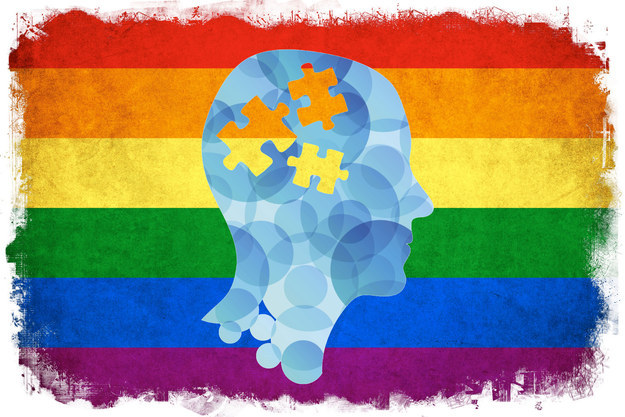BuzzFeed Science Writer
Depression, anxiety, and other common mental health problems are nearly twice as common among LGB people as among the rest of the population.

A major study has found that gay, lesbian, and bisexual people in Britain are much more likely to suffer from mental health problems than the rest of the population.
The research is a meta-analysis, or study of studies, published in the journal BMC Psychiatry and looking at large-scale population surveys in England, Scotland, and Wales. Of the 94,000 responses, 1.1% identified as lesbian/gay, 0.9% as bisexual, and 0.8% as “other”.
A total of 16.8% of heterosexual people surveyed said they had symptoms of some sort of common mental disorder, such as depression or anxiety. But 26.2% of lesbian and gay people, 34% of bisexual people, and 23.8% of those who described themselves as “other” reported similar symptoms.
Scientists already knew that LGB people were at more risk of mental health problems, but it has rarely been shown so clearly in Britain before.
“It’s something we’re aware of,” Dr Joanna Semlyen of London Metropolitan University told BuzzFeed News. “But the data has usually come from US studies.”
Dinesh Bhugra, a professor of mental health and diversity at King’s College London, agreed, saying that the figures “do not come as a surprise”. “There is remarkable evidence from over the years. Studies around the world have shown rates are higher for mental disorders and suicide.”
The study can’t show why LGB people are at greater risk, but there are lots of possible reasons.
“The stress that results from being a member of a minority is one of the main reasons we see mental disorder in LGB people,” said Semlyen. “We know that social support is a protective factor in mental health. So is feeling included, feeling safe, not feeling rejected by your family.” Gay people may be more isolated, more lonely, less likely to have family and social support, she says.
Bhugra said that “there is increasing evidence that the way we’re brought up affects our brain structures, and therefore our brain functioning”.
He says that the situation is probably getting better, as Britain (and the world) gets more gay-friendly. “There’ve been some fascinating studies done in America that show that gay-friendly social policies lead to rates of mental health problems dropping,” he said. “One study looked at a state before changes in the law and afterwards, and there was a clear drop in mental health problems afterwards. It would appear that there is a causal effect.” The implication is that as LGB people feel more welcome and included in society, they are less likely to suffer mental health problems.
The problem is even worse among young people and older people.
LGB people under 35 were nearly twice as likely as straight people to report having poor mental health, while LGB people over 55 were more than twice as likely. People in the middle, aged 35 to 54, were also at greater risk, but at much lower levels.
Again, the study wasn’t able to say why it differs with age like that, but one of the researchers had some thoughts.
“In the younger cohort, it could be that people are navigating the process of coming out, coming to terms with a sense of being different,” Semlyen said. “Among older people, it could be that they grew up in a time when things were less supportive for LGB people – when their sexuality was perhaps still illegal.” She warned that this is just speculation but that it matches other things we know.
Bhugra agreed with this assessment. He told BuzzFeed News: “I’m not surprised by the age profile. Young people who are struggling to come out might be very isolated, lonely, bullied at school.” He added that there was another possible factor for older people: “It may be related to not having a partner, social isolation, reaching retirement age and looking back and wishing you had had children, that sort of thing.”
The study didn’t look at trans people’s mental health, because the data doesn’t exist. That could be a problem.
All of the information comes from surveys with names like the British Cohort Study or the Health Survey for England. Those surveys, nowadays, include a sexual orientation question – but not a gender identity question. That means it is very hard to get good demographic data on trans people.
Semlyen said that she wants that to change. “We want health surveys to include a question on gender identity,” she said, “to allow us to also analyse mental health among trans people. There’s no data at all on population health for trans people.” That makes it harder to work out measures to improve health and wellbeing in the trans community.
It also couldn’t look at the interaction of race and sexual identity, because there weren’t enough LGB people who were black or minority ethnic to get a statistically significant sample. But race “definitely does have an effect”, said Bhugra.
Also, the data only gives sexual identity, not information on behaviour or attraction.
“We’d also like [these surveys] to collect data on attraction and behaviour as well,” said Semlyen. “Not everyone identifies as a category or label.” For instance, some men have sex with men, or are attracted to men, but don’t consider themselves “gay”, she says.
“There’s also people who consider themselves ‘queer’ or ‘no label’, there are all these other ways to be,” she said. “And remember, those labels are often pejorative; they carry quite a lot of stigma.”
That means, she said, that we could be missing part of the picture: “There’s some evidence that same-sex attraction and same-sex behaviour is linked to mental health problems, but there’s no UK data.”
It’s for this reason that the study looked at people who ticked the “other” box. “That’s a whole group of people who are actively not choosing LGB, but they’re also not choosing heterosexual,” says Semlyen. “And they are experiencing equivalent low wellbeing and mental disorder.”
Even the data the surveys do get is hard won. It wasn’t long ago that even questions on sexual identity weren’t asked in demographic surveys. “Every question in these surveys costs money,” said Semlyen. “Ethnicity, age, that sort of thing’s a given, but this stuff is not.
“But these questions are very important to try to understand why people are experiencing what they’re experiencing.”
Tom Chivers is a science writer for BuzzFeed and is based in London.
Source: Buzzfeed.com




